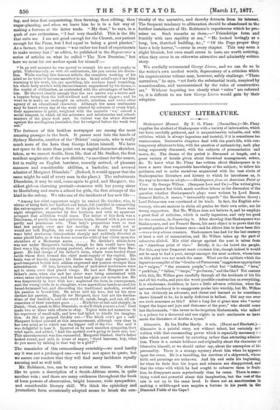CURRENT LITERATURE.
Shakespeare Manual. By F. G. Fleay. (Macmillan.)—Mr. Fleay supplies the student of Shakespeare with a variety of information, which has been carefully gathered, and is unquestionably valuable, and with criticism which is always ingenious and tasteful, if it is sometimes too venturesome. Successive chapters deal with the poet's life, with con- temporary allusions to him, with the question of authenticity, each play being separately discussed, with the subjects of pronunciation and metre, do. The drama of the period is discussed at length, and a great variety of details given about theatrical management, asters, die. To know what Mr. Fleay has written about Shakespeare is to have a more than respectable knowledge of the subject ; to follow his guidance, and to make ourselves acquainted with the vast circle of Shakespearian literature and history to which he introduces us, is the way to become an adept. —Shakespeare from an American Point of View. By George Wilkes. (Sampson Low and Co.)—The writer gives what we cannot but think much needless labour to the discussion of the question whether Shakespeare's plays were written by Lord Bacon. General Butler, it seems, "favourably regards" the Baconian theory ; Lord Palmerston was convinced of its truth. In fact, the English aris- tocracy, who are anxious to claim all genius for their own order, are its strong supporters. But Mr. Wilkes does not believe it, and he employs a great deal of criticism, which is really ingenious, and only too good for the occasion, in disproving it. After showing that Shakespeare was Shakespeare, and not Francis Bacon, his next object is to prove that the greatest genius of the human race—and he allows him to have been this —was a very odious creature. Shakespeare has had for the last century at least a sort of canonisation, and Mr. Wilkes takes up the part of advocatus diaboli. His chief charge against the poet is taken from an "American point of view." Briefly, it is,—he hated the people. For this, any true Democrat must condemn him, though indeed it would not be easy to find a poet, except amongst the most modern, whose tone on this point was not much the same. What are the epithets which the ingenious compiler of the " Gradus ad Parnassum "suggests as appropriate for" vulgus," "the common people,"—what but " infidum," " leve," perfidum," " fallax," " turpe," " profanum," and the like ? Not content with this, Mr. Wilkes goes carefully through all the incidents of his life and all his works, and puts the worst possible construction on everything. It is wholesome, doubtless, to have a little adverse criticism, when the universal tendency is to exaggerate praise into worship, but Mr. Wilkes is too obviously an advocate, and clever and learned as he sometimes shows himself to be, he is sadly deficient in ballast Did any one ever see such nonsense as this ? After a long list of great men who "never forgot the hopes and joys and distresses of the poor," who should come but Sheherezade, "the never-to-be-forgotten Sheherezade, who talked to a prince for a thousand and one nights in such sentiments as hare made the literature of Arabia a hymn."


































 Previous page
Previous page